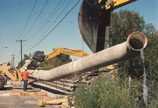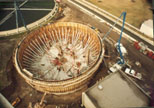Bulletin Board
WIN Urges Federal Funds to Cover National $23 billion Annual Short-fall
A new report urges "A Renewed National Commitment To Water And Wastewater Infrastructure."
May 9, 2000
|
|
|
|
Water and wastewater entities are facing increasing operations and maintenance costs in providing services through aging systems, squeezing capital investments necessary to meet more stringent standards and plant and system replacements. Fearing lack of adequate funding, WIN is concerned that the gains made since Congress passed the Clean and Safe Drinking Water Acts will be, in part erased. The report reads, "New solutions are needed to what amounts to nearly a trillion dollars in critical water and wastewater investments over the next two decades. Not meeting the investments… risks reversing the environmental, public health and economic gains of the last three decades."
The report sites the public health, environmental and economic benefits of clean and safe water. Public health and protection against waterborne disease enhances the quality of life of all Americans. Clean and safe water for recreation, commercial fishing and industrial activities promote a strong economy. Recreation and tourism generate taxable income and jobs. In other words, according to WIN, the return in water and wastewater investments far outweighs the federal costs.
WIN believes that federal involvement is practically the only sure way to meet capital investments and meet new federal mandates in the form of more stringent standards. It premises its belief on the "out of sight out of mind" principle. "Unlike other types of infrastructure needs, water and wastewater investment needs are rarely known or understood by the public since they rarely see or come in direct contact with the physical works." This, WIN claims, can result in lack of public support to higher fee increases at the local level. Even if there is no public and political opposition, there is the matter of equity and affordability issues. Many of the nation's 54,000 drinking water systems and 16,000 wastewater systems will exceed EPA's affordability benchmark of households paying more than 4 percent of household income for combined water and wastewater services. This will affect about 22 percent of the nation's low and middle-income households. Federal funding will ensure that every American family can afford the benefits of clean and safe water.
WIN makes a compelling case that the nation's water and wastewater systems need federal help to avoid adversely impacting a substantial portion of America's population. Moreover, if there is growing pressure on local government to keep water and wastewater costs down, the gains in clean and safe water may backslide. The WIN report reads, "There is ample justification and precedent for such a federal role," continuing, "Indeed, the federal government has played, and continues to play, a major role in funding other critical aspects of our public works infrastructure, such as highways, airports, harbors and mass transits."
WIN urges "A new national dialogue…with participation from all sectors of American society… (to make) water and wastewater infrastructure…a national priority."
WIN Members
Association of Metropolitan Sewerage Agencies, Association of Metropolitan Water Agencies, American Public Works Association, American Society of Civil Engineers, Association of State Drinking Water Administrators, American Water Works Association, Construction Industry Manufacturers Association, National League of Cities, National Rural Water Association, National Society of Professional Engineers, Rebuild America Coalition, Water Environmental Federation, Western Coalition of Arid States, Water and Wastewater Equipment Manufacturers Association, American Consulting Engineers Council, The Associated General Contractors of America, Council of Infrastructure Financing Authorities, Environmental Business Action Coalition, Environmental and Energy Study Institute, U.S. Conference of Mayors and Clean Water Action.

